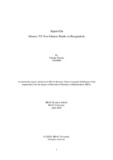Islamic VS Non-islamic banks in Bangladesh

View/
Date
2020-04Publisher
Brac UniversityAuthor
Tanzim, TanishaMetadata
Show full item recordAbstract
IDLC Asset Management Limited (AML) is a wholly owned subsidiary of IDLC Finance Limited (FL) which is one of the largest non-banking financial institutions in Bangladesh. The parent company offers services such as home loan, car loan, term loan, seasonal loan, supplier finance, lease financing, project financing, merger and acquisitions, etc. With only 5 employees, it started as a single product lease finance company in 1985. After 33 years the company is one of the largest and renowned multi-product multi-segment non-banking financial institution in Bangladesh. IDLC AML commenced operation from 2016. It offers investment knowledge, investment products and investment return in Bangladesh for both individuals and institutions. Products/services include 3 open ended mutual funds: IDLC Balanced Fund, IDLC Growth Fund and IDLC AML Shariah Fund. The company intends to provide a catered investment tool for its clients through lumpsum investment and their newly established IDLC SIP (Systematic Investment Plan).
In IDLC AML, I worked as an intern under their portfolio management division. My duties were to assist the portfolio management team’s research wing. Regular tasks involved data inputs for their stock watchlist, Weekly Mutual Funds Review and sometimes data collection for companies soon going for IPO. I have also assisted Navin Rahman, Investment Analyst, in creating a bank database consisting financial data of 30 listed banks in Bangladesh. Data ranged from entire Balance sheet and Income statement to few necessary breakdowns from the banks’ annual reports ‘Notes’ section; many further calculations were required to complete the database. The purpose of this database is to enable an individual to simply type a bank’s name and be able to see multiple financial performance indicators such as CASA ratios, CAR, NIM, growth rates, loan defaults, etc.
My research was conducted on the Bank Database Project. A time series and cross-sectional analysis was carried out on 30 banks to determine several independent variables affecting the performance of these banks. The research is further focused towards uncovering whether Islamic banks differ from Non-Islamic banks in terms of performance. If yes, why? The answer to this question represents my core findings. Explanations, backed by Bangladesh Bank rules and regulations, are provided for every type of correlation discovered in this study. Several important ratios were calculated to determine overall comparative performance of the banks. Lastly, recommendations are provided to help banks improve their performance in excess of pre-determined standards.
